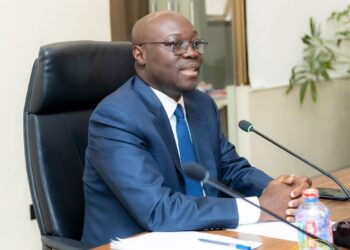Fitch Solutions has adjusted its end-2025 forecast for the Ghanaian cedi, revising it to GHS13.0/USD, from an earlier estimate of GHS15.5/USD, following a notable appreciation of the local currency in recent weeks.
According to the economic research firm, the cedi has strengthened by 30% between late April and May 2025, primarily driven by higher global gold prices.
Consequently, Fitch now expects the currency to appreciate by 12.9% in 2025, up from its end-2024 level of GHS14.7/USD.
The more robust exchange rate, Fitch explains, will help alleviate inflationary pressures and create room for the Bank of Ghana (BoG) to pivot towards monetary easing in the second half of the year.
As Ghana remains a net importer of major consumer items such as fuel, cereals, pharmaceuticals, and plastics, a stronger cedi is projected to exert a significant disinflationary impact, especially on imported goods.
Although the BoG raised its policy rate by 100 basis points in March 2025 to 28.00% due to persistent inflation earlier in the year, Fitch anticipates a reversal in this stance. It forecasts a total rate cut of 200 basis points in the second half of 2025, which would lower the policy rate to 26.00% by year-end.
On inflation, Fitch highlights that headline inflation is beginning to moderate after a challenging start to the year. April 2025 recorded year-on-year inflation of 21.5%, a decline from 23.5% in January.
The firm projects average inflation of 18.0% for 2025, ending the year at 13.1%, which moves inflation closer to the pre-pandemic average of 12.4% recorded between 2015 and 2019.
The expected slowdown in inflation – alongside cedi appreciation and monetary policy easing—is forecast to improve household spending power and accelerate consumer demand growth in the latter part of the year.
Meanwhile, the Governor of the Bank of Ghana, Dr. Johnson Asiama, has rejected claims that the central bank is targeting a specific level for the cedi’s appreciation. He emphasized that the Bank’s exchange rate strategy is aimed at reducing excessive volatility, not fixing exchange rate thresholds.
Speaking at a press briefing following the recent Monetary Policy Committee (MPC) meeting, Dr. Asiama clarified:
“We don’t have such a plan on the table that says when the cedi reaches a certain point, we must move to ease the appreciation,” the Governor asserted.
He further reinforced that the BoG’s actions remain guided by market conditions and the broader macroeconomic environment, not by pre-set exchange rate levels.





































